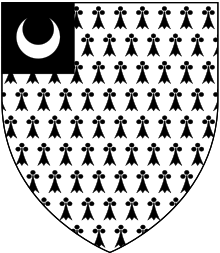John Strode (c.1561-1642)
Sir John Strode (c. 1561 – bef. 15 July 1642), of the Middle Temple, London and Chantmarle, Cattistock, Dorset, was an English MP for Bridport in 1621 and 1625.[1]
John Strode | |
|---|---|
_-_Portrait_de_Sir_John_Strode%2C_RF2118.jpg) Portrait of Sir John Strode 17th century, after Anthony van Dyck | |
| Born | circa 1561 |
| Died | before 15 July 1642 (aged 80–81) |
| Nationality | English |
| Occupation | Lawyer |
| Years active | 1590–1642 |
| Spouse(s) | Anne Chaldecote Ann Wyndham |
| Children | Sir John Strode George Strode Hugh Strode Thomas Strode |
| Parent(s) | John Strode Katherine Cromwell |

Early life
Born circa 1561, Strode was the third son of John Strode of Parnham, Dorset and his first wife, Katharine, daughter of Gregory Cromwell, 1st Baron Cromwell and Elizabeth Seymour.[1]
Strode was educated at New Inn, then Middle Temple, 1583. He was called to the bar in 1590.[1]
Career
Strode, a lawyer by profession, who gained a reputation as "an honest, trusty, learned, religious gentleman",[2] served as a Justice of the Peace for Dorset by 1593-1642, comissioner sewers 1617, martial law 1626, knighthood compositions 1631, piracy 1631.[1]
He was Autumn reader, Middle Temple in 1611, bencher from 1611–1642, treasurer from 1619–20; recorder, Bridport, Dorset from 1618–1640. He was knighted at Theobalds 1 December 1623.[1][3]
He died at the Middle Temple before 15 July in 1642.[1][3] His widow was murdered defending Parnham House, near Beaminster in Dorset, in 1645 by a soldier under the command of Sir Thomas Fairfax during the Civil War.[2]
Marriages and issue
Strode married twice. He married firstly, Anne (d. 8 Aug. 1621), daughter of William Chaldecote of Quarleston, Dorset, and widow of Robert Bingham (d. 1587) of Bingham’s Melcombe, Dorset, by whom he had no children.[1]
He married secondly, 12 January 1622, Ann (d. 1645), daughter of Sir John Wyndham of Orchard Wyndham, Somerset, by whom he had four sons and two daughters:[1]
- Sir John Strode (1624–1679)[2]
- George Strode[2]
- Hugh Strode[2]
- Thomas Strode[2]
Notes
References
- Aspinall-Oglander, Cecil (1945). Nunwell Symphony. London, UK: Hogarth Press.
- Ferris, John P.; Hasler, P.W. (1981). "Strode, George (aft.1563-1648), of the Middle Temple, London and Wimborne Minster, Dorset". In Hasler, P.W. (ed.). The History of Parliament: the House of Commons 1558-1603. historyofparliamentonline.org.
- Ferris, John P. (2010). "Strode, John (c.1561-1642), of the Middle Temple, London and Chantmarle, Cattistock, Dorset". In Thrush, Andrew; Ferris, John P. (eds.). The History of Parliament: the House of Commons 1604-1629. historyofparliamentonline.org.
- Fragmenta Genealogica. VIII. 1902. pp. 127–131. Retrieved 7 August 2020.
- Harvey, William (1887). Metcalfe, Walter C. (ed.). The Visitation of Dorsetshire, by William Harvey, Clarenceux King of Arms. Exeter: William Pollard & Co.
- Hasler, P.W. (1981). "Strode, John (1524-81), of Parnham, Dorset". In Hasler, P.W. (ed.). The History of Parliament: the House of Commons 1558-1603. historyofparliamentonline.org.
- Miller, Alan J. (November 2007). "Murder Most Foul". Dorset Life – The Dorset Magazine. dorsetlife.co.uk. Retrieved 5 August 2020.
- Vivian, J.L. (1895). The Visitations of the County of Devon, Comprising the Heralds' Visitations of 1531, 1564, to 1620. With additions by J.L. Vivian. Exeter: Henry S. Eland.
External links
- Ferris, John P. (2010). "Strode, John (c.1561-1642), of the Middle Temple, London and Chantmarle, Cattistock, Dorset". In Thrush, Andrew; Ferris, John P. (eds.). The History of Parliament: the House of Commons 1604-1629. at historyofparliamentonline.org